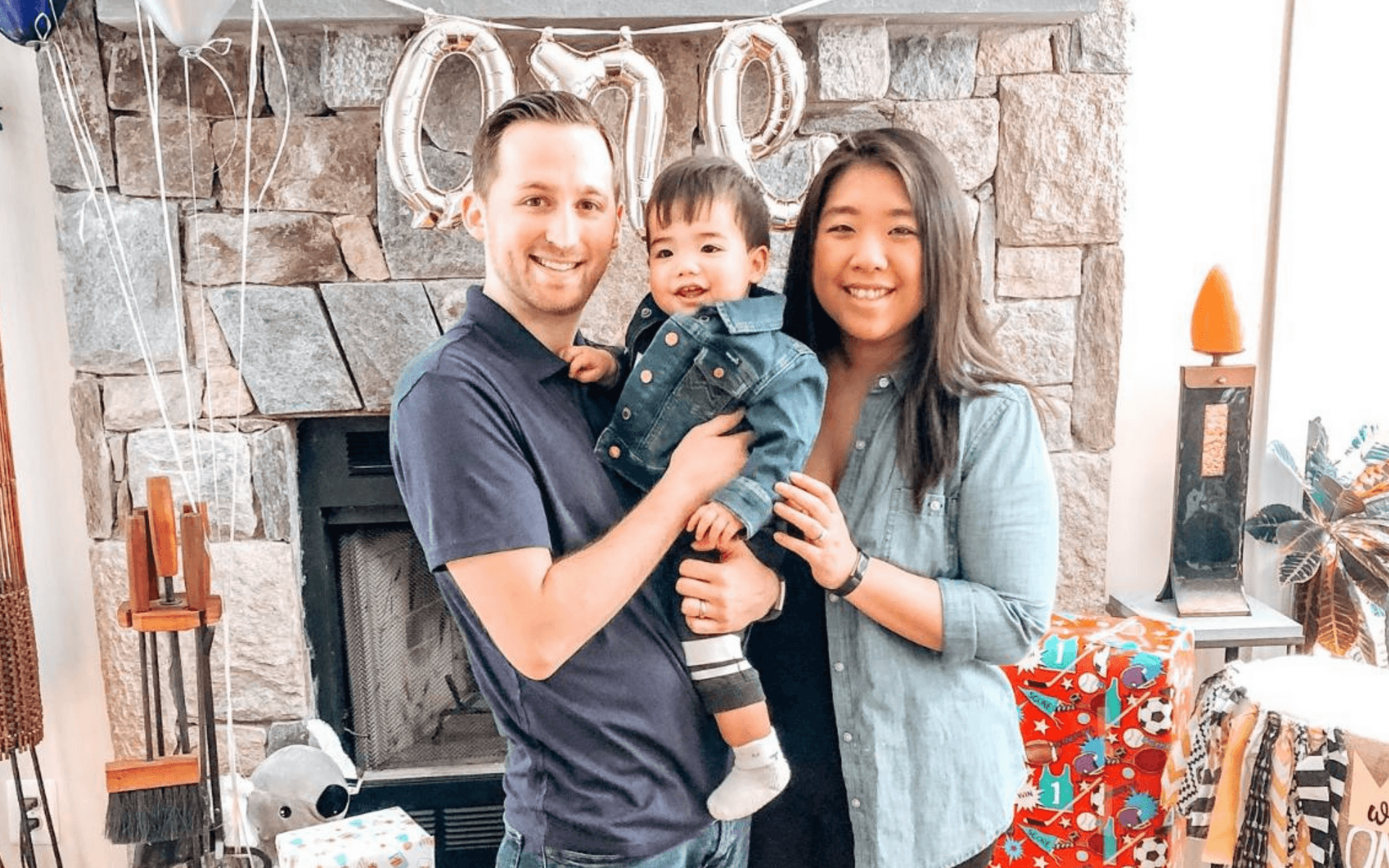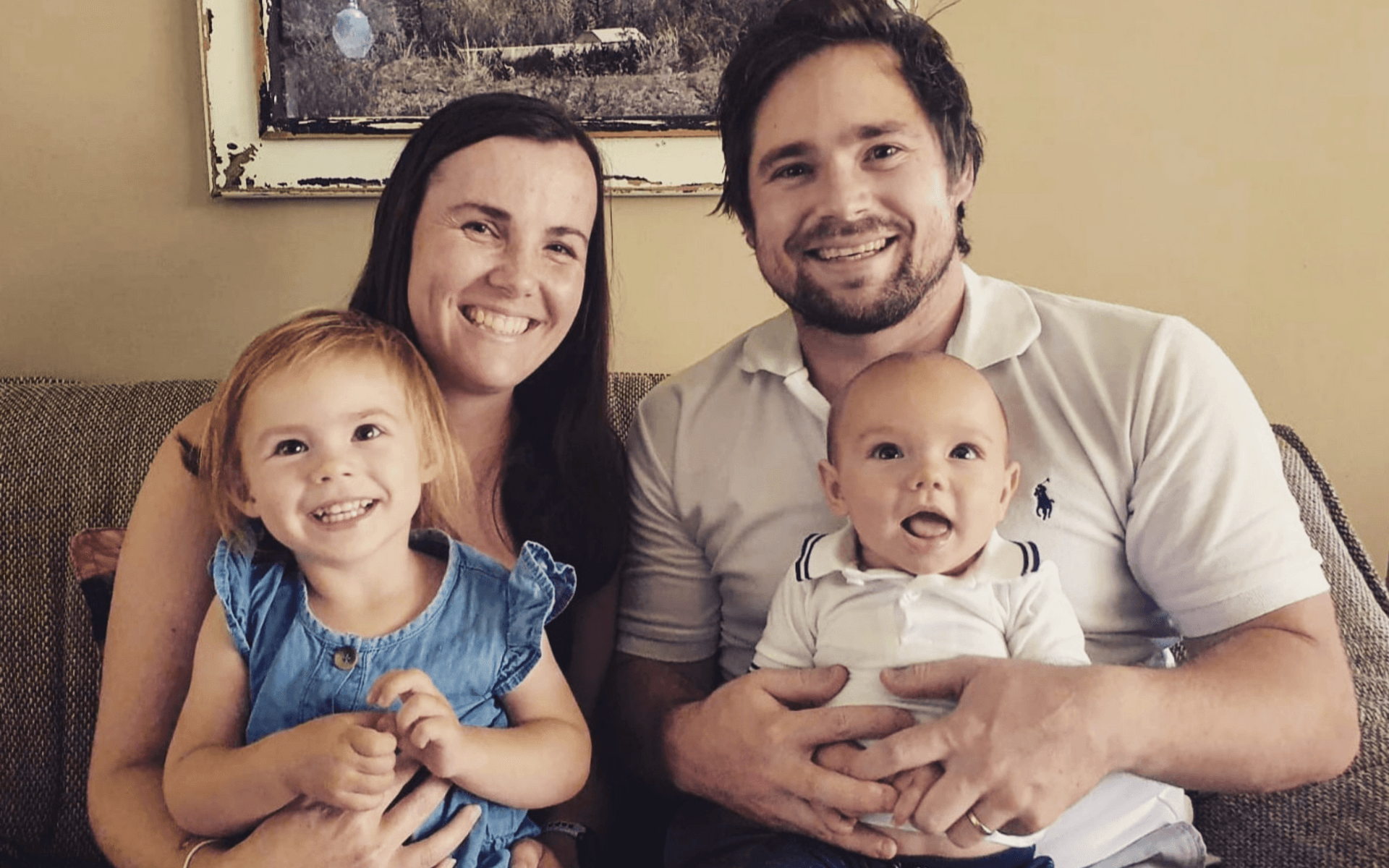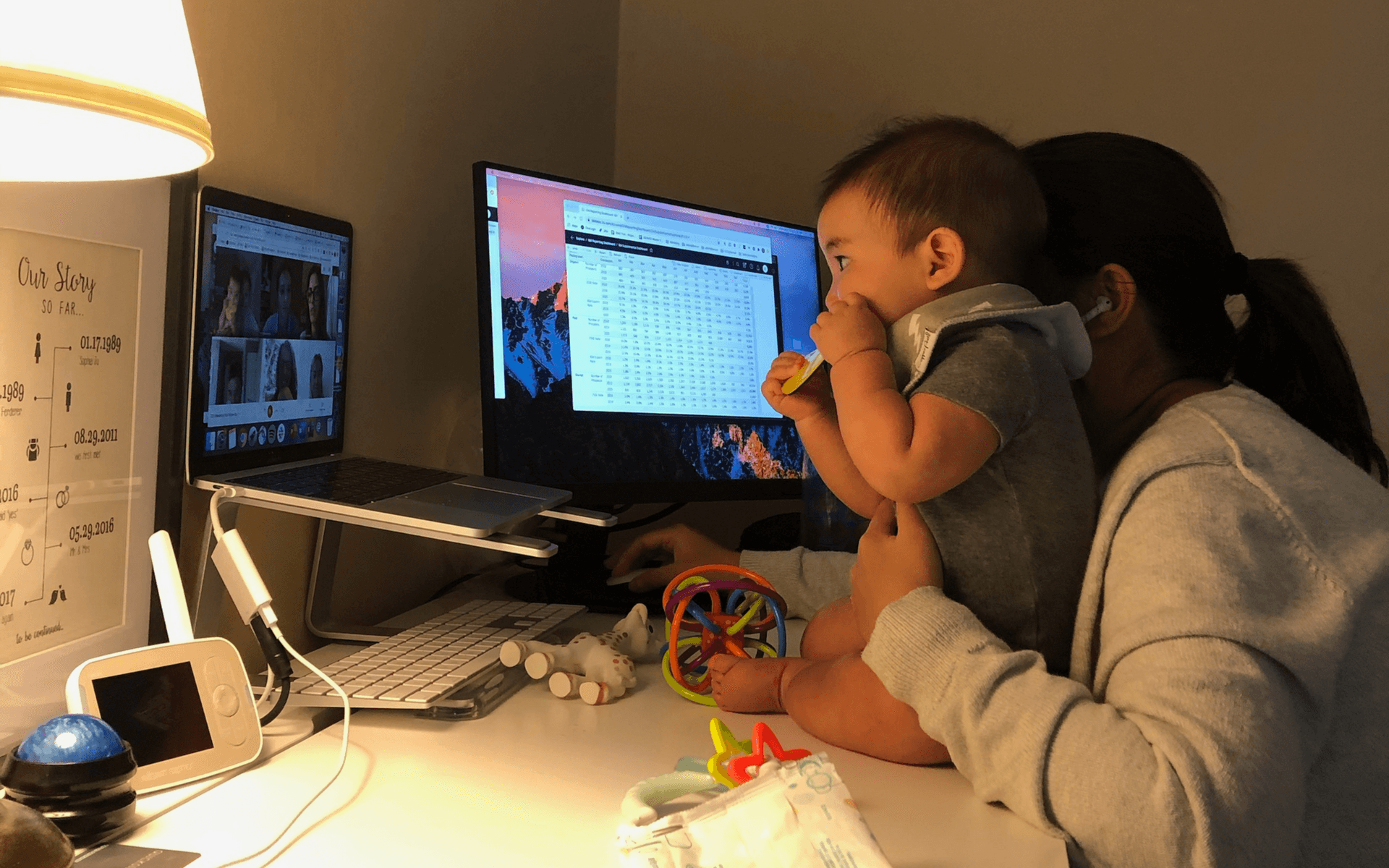Culture
Two Working Moms at 2U Share Their Stories of Balancing Childcare and a Full-Time Job Amid a Pandemic
Written by Molly Forman on Mar 25, 2021
Related content: Diversity And Inclusion

While the global economy is beginning to bounce back after a tumultuous pandemic year, no one is experiencing “business as usual.” With COVID-19 on their minds, many professionals have found it challenging to do their jobs, suffer from a lack of work-life balance, have experienced burnout to various degrees, and are concerned about their financial security. But one segment of the workforce continues to be more disproportionately impacted by the crisis over others: women, especially working moms.
For working moms, a “double shift”—a full day of work followed by childcare and household upkeep—is often the norm, but as schools and daycares closed in response to the pandemic spreading, the support that made a double shift possible no longer existed. This massive increase in caregiving responsibilities exacerbated the stressors already associated with being a working mom, and the results of their impact are clear.
According to the 2020 Women in the Workplace study co-authored by McKinsey & Company and LeanIn.Org, one in four women are considering life changes they would not have a year ago: downshifting their careers or leaving the workplace altogether. And 40% of mothers have added three or more additional hours of caregiving a day to their schedule, amounting to 15 or more hours a week. That’s a part-time job.
How do we prevent these trends from setting back working moms in ways that could impact workplace gender equality and reverse progress toward a more inclusive workforce? Read on to learn about the lives of two women at 2U, Senior Manager of Strategic Projects Louise Dobson and Senior Brand Marketing Strategist Sophia Ferderer, in two vastly different parts of the world—Louise in Cape Town, South Africa, and Sophia in Gaithersburg, Maryland—who have personally dealt with the realities of what it’s like to be a working mom these days. They share their stories of doubt, growth, resilience, and offer up advice.

Let’s start with the basics: What does an average weekday look like for you?
Louise Dobson (LD): My day usually starts by 5:30 a.m. with my 8-month-old son, Jordan’s, first feed of the day. Before 7:30 a.m. our household is busy getting our 2.5-year-old, Taylor, dressed and ready for school, packing Taylor’s lunch and school bag, and eating breakfast. This is followed by school drop-offs, picking up Jordan’s nanny, and walking our Golden Retriever, Maple, before the workday starts. Late afternoon activities include a family walk with Maple, and then we dive straight into making dinner, starting the bath routine, and bedtime stories. By 7 p.m. I finally have my feet up relaxing!
Sophia Ferderer (SF): My day usually starts at 6:30 a.m. when my 1-year-old wakes up for the day. We do daycare on Tuesday, Thursday, and Friday, and my parents come to watch him on Monday and Wednesday. My husband and I switch off who gets up with him and gets him ready for the day and makes breakfast while the other showers and gets themself ready. At around 8:00 a.m. we swap roles. If it’s a daycare day, we leave for daycare drop-off and start the workday at 8:30 am. If it’s a stay-at-home day with the grandparents, we play until my son goes down for his first nap at 9:30 a.m. Once the workday is over, if the weather allows, we try to go on a family walk around the neighborhood and then begin making dinner. My husband and I switch nighttime routines with my son so that the other has some time to go for a run or take some personal time while the other does bath time and bedtime. My son is usually asleep between 7:00-7:30 p.m., which is when we’ll do some cleaning, laundry, prep for the next day, and then relax (finally) by 8:00 pm!

The average weekday you each described includes childcare support, which wasn’t available to you during the early days of the pandemic. How has COVID-19 impacted your approach to being a mom and a full-time worker? What challenges have arisen for you as a result of COVID-19? Are there any surprising benefits you can share?
LD: Since COVID, I’m definitely more flexible and not so anxious and stressed at the thought of having to try and juggle/balance childcare and work. I had my second child in July mid-pandemic, and it was tough. Juggling a toddler, work, and pregnancy with no help (no school or nanny) was hard, and it was essential to drive more time efficiency into my workday to get things done. I am now more fluid and have since realised that things may not always go according to plan. Being adaptable is key.
Some benefits of working from home are that I am able to spend so much more time with my children, I no longer have to commute to work, and with Jordan being looked after at home, I don’t have to express milk (and worry about whether or not the wellness room at the office will be available when I need it). This saves so much time. I have also been able to witness his milestones, which is such a blessing.
SF: I now understand and realize that doing my very best was and is enough—both as a mom and as a full-time worker. This has helped me accept that not every day will be perfect—some days you’ll need to bring your baby to a meeting because he won’t nap, and some mornings he’ll wake up with a cold and you’ll have to clear your day. Some days you’ll be hit with last-minute deadlines, and you may have to miss bedtime. At the end of the day, you’re doing your best, and it is enough.
Overcommunication has become key in my approach to being a full-time working mom—overcommunication with my partner, my family, my teammates, and my manager. It’s so important to communicate your needs, challenges, schedule conflicts, or when you just need a moment to breathe.
A surprising benefit of becoming a new mom during a pandemic is that I’ve gotten to spend so much more time with my son and watch him grow. Working from home has allowed me to be able to quickly sneak downstairs for a 15-minute break from my workday and play with him and spend time with him. These are moments I wouldn’t have gotten if we were still commuting and working in the office.

Has your experience at work been different from your partners’ since becoming a mother?
LD: My husband and I both have very supportive companies who understand that we need to be flexible at times. I think it depends on the company that you work for and your manager/team. My husband is incredibly hands-on, and the two of us are co-parents equally. Our children are not exposed to a “dominant” parent—we are both equally present.
SJF: I feel fortunate to have a spouse/partner who believes in equality for men and women in both our personal lives at home and in the workplace, especially since we both work at 2U. We have been committed to talking to each other about differences we experience in and out of the workplace when it comes to unequal treatment between women and men as an opportunity to continue to learn and evolve.
I think one distinct difference that I’ve noticed with how others engage working mothers versus fathers in the workplace is that asking about my son is always the first question, sometimes even before “how are you?” in meetings. For working fathers, I’ve observed that if it comes up, it’s usually an afterthought. Business comes first. While minor, it’s noticeable.

Before going on maternity leave and while on maternity leave, many women think about how their careers will change when they return. Will they be looked over for a promotion? Will they be treated differently? What was your experience like?
LD: It’s definitely a daunting time returning to the office after being out for so long. My anxiety was heightened, and I questioned and doubted my abilities. I have an incredible manager who really assisted with my return back to work, ensuring I didn’t have too much on my plate initially and reminded me not to put too much pressure on myself.
Raising children often requires women to step out of the working world at critical times in their professional development whilst facing real and perceived barriers to professional development upon their return. The impact of those spoken and unspoken hurdles can often shape issues like pregnancy discrimination, gender pay gaps, and fewer women rising to leadership positions in the workplace. Whilst this hasn’t been my direct experience (2U is a phenomenal company to work for—they really support working parents), they are all issues that organisations need to be actively working to counteract as they are often systemic to corporate cultures and supported by unconscious biases.
SF: Unfortunately, we still live in a society where the fear of women having to “pause” their careers in order to start a family is very real. The conversations and concerns I had with my manager ahead of maternity leave differed greatly from the conversations or concerns my husband had. For example, I felt it was important to voice my concerns and fear that being on leave for 12 weeks would set me back in my performance, cause me to take a backseat on the team, or have the progress I’ve made in my career path “reset.” I feel fortunate that my team’s leadership provided me with reassurance and support, and that I have not felt that my leave or my new role as a mom has negatively impacted my role on the team in any way.
The network of working moms at 2U has been a lifeline for me as I navigate being a first-time mom, a working mom, a pandemic mom, and a minority mom during a vital time for fighting social injustices. It truly takes a village, and I feel fortunate to have had so many 2U moms in my village to help me transition back after maternity leave, but also to help me celebrate my good days, keep me grounded on the hard days, and simply provide me a safe space when I need it.

Are there any resources you would suggest to working moms looking for support?
LD: Virtual support groups, chat to friends regularly and share stories—you’ll be surprised how many people are going through the same things as you are. Being able to relate to others helps you to not feel alone.
SF: The Instagram account @momsandproud has daily reminders that you are not alone, and you’re crushing it!
Reach out to other working moms and normalize the conversation that motherhood is hard! I promise whatever you are going through, you are not the only one, and so many other women are ready to support you and lift you up.

For expecting moms, what advice do you have to share on juggling career and home life?
LD: Be gentle on yourself and take each day at a time. Being a working mom is difficult and comes with its challenges. It does get easier with time as you learn to adapt. It’s OK to ask for help and be transparent with your manager so that they are aware of what’s going on in your life.
SF: You are going to be a good mom, a great mom. Some days are going to be really hard. Your expectations for yourself and your baby will change, and that’s OK. Make sure you remind yourself that your mental health matters too—ask for help or time when you need it, both personally and professionally.
From the 2020 Women in the Workplace study, we know that the events of 2020 have caused many women to consider downshifting their careers or leave the workforce. What’s one piece of advice you have for companies at risk of losing current and future women leaders?
LD: Encourage working moms to not be afraid of speaking out about the challenges and setbacks they face. Let them feel supported and heard. Some days can be unpredictable no matter how much you may have planned, so allowing for flexibility is so important and really makes a difference.
SF: Continue to create awareness of the challenges that working moms face in the workplace—even long after the pandemic is over and we return to the office. COVID has added a complex layer of difficulty over the last year to parents, but these challenges didn't start with the pandemic and they won't end when the pandemic is over either. Keep the conversation going, continue to recognize (and solve for) the challenges, and normalize the conversation on gender bias.